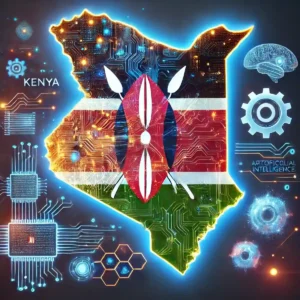AI impact on education: What will happen to Lecturers and TVET Tutors in Kenya now that AI is here? Is it the end of the road?
If you’re a tutor or lecturer in a higher education institution in Kenya, hear this:
AI is rapidly changing the world of work and it will change higher education in Kenya in a huge way.
I know what you’re asking yourself now- is my job as a university lecturer or TVET trainer in the line?
Well, in this article, I share my thoughts about how the way we teach our young people will change (in colleges and universities) and how you should prepare to remain relevant in the fast-approaching new system, which will be majorly AI-Driven.
AI impact on education: How AI Will change Higher Education and TVET System in Kenya- and How to Get ready as a University Lecturer/TVET Trainer
1. Jump from Preparing and Delivering Content to Facilitation
For a long time, Lecturers and Tutors main role has been to create educational content, of the course they’re teaching.
Enter AI- AI generates content, summarizes textbooks, and even create quizzes excellently.
So lecturers and trainers will probably cease being the primary source of knowledge…students who know AI will be able to get the content by themselves provided they have the syllabus/occupational standards(in TVET)
That being so, the value of lecturers and trainers will change to:
- Guiding learners on how to think critically.
- Helping students apply the knowledge they get from AI in real-world contexts.
- Facilitating discussions and debates, especially on issues such as using ethics, interpretation, and originality when using AI in education.
2. More Focus will be put on Innovation and Research
Even in these early days of AI, AI tools such as ResearchRabbit and Connected Papers are assisting tremendously in tasks such as literature reviews, data analysis, and even drafting.
Therefore, Lecturers who learn how to use AI Research Tools like will boost their research productivity– and hence become the go-to resource people when it comes to research.
Remember the government has been urging universities to invest more in research and innovations as one way of becoming self-sustaining so AI might be a golden opportunity for our institutions to finally take that route- and with that demand for academics who can integrate AI tools in complicated research studies will soar.
Keep in mind that even as you go that direction (if you think your future might be safe in leading ground breaking research projects), it is important to work on retaining originality and critical thinking in these roles (nobody will pay you to deliver AI-regurgitated work).
Note: On AI Know Zone’s YouTube Channel, we have this Video on AI based research tools – and you can see that there are tools that simplifies Research Work for academicians in ways nobody could have imagined a few years ago..
3. Job Losses or Some Redundancies? Possibly!
- Lecturers and Trainers who stick to old teaching models (purely lecturing or copy-pasting slides/notes) may become irrelevant.
- Adjuncts or part-time lecturers who are working in content-heavy fields (think business, history, or communication courses) may see their demand reduce- since these fields are mainly theoretical and AI does a better job in creating the required educational content.
- Universities and Colleges may downsize departments that do not perform – They may also automate repetitive administrative tasks such as customer care (so even support stuff working in these institutions need to upskill).
4. New Opportunities If you’re a Forward-Thinking Educator
Educators who:
- Integrate AI tools, for example MagicSchool, Curipod, and Eduaide.Ai into the classroom.
- Coach students and trainees on how to use AI technology ethically and productively.
- Focuses on practical, project-based learning.
- Engages in blended/online course delivery…
…will become more valuable – could also potentially reach more students beyond Kenya, meaning they can as well start earning from selling online courses or consultancy services globally.
5. Skills Gap Between Lecturers/Trainers Will Widen
Just like it was when the computer and internet first came around, some trainers will adapt to AI based teaching faster than others.
Trainers who:
- Continuously learn.
- Stay curious.
- Re-skill in crucial areas (AI literacy, prompt engineering, instructional design..and the like)
…will become the leaders of higher education institutions in Kenya.
6. Curriculum Will Evolve
On their part, TVETs and Universities will have to:
- Update all their courses to include AI units (Starting with AI ethics and AI literacy)- these will be the new mandatory and common units.
- Teach skills AI is unable to teach well to make their graduates stand out in the job market (trainees who have outstanding emotional intelligence, leadership, creativity, and critical thinking skills will be the most in-demand in the changed job market).
AI impact on education – Conclusion
Rather than eliminating your role as a trainer, AI is more likely to transform the nature of your current role.
I have shared what to expect so its upon you – and education sector stakeholders plus our government- to get ready.
Reminder: AI won’t replace lecturers and trainers in Kenya—but lecturers and trainers who use AI are likely to replace those who ignore AI.
So this is a good time to reinvent yourself as a mentor, facilitator, and lifelong learner.
About the Author:
C.P.A John W. Gitahi is a Tech and AI Enthusiast and Founder of AI Know Zone Foundation, a charity which helps young people in Kenya to prepare for the new AI-Dominated World of Work.
He teaches at Kenya Online College.
Write to him: jwgitahi@aiknowzonefoundation.org
ALSO READ:
Artificial intelligence Kenya: Adapt or Perish
Is AI a threat to humans? Connection between AI and Grief



